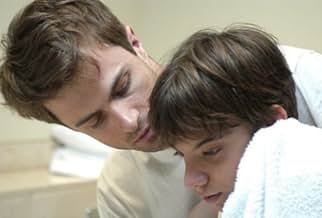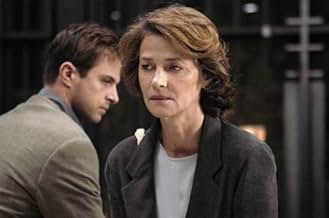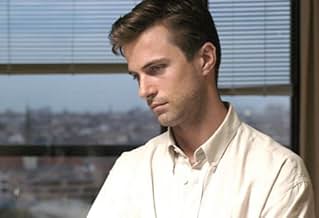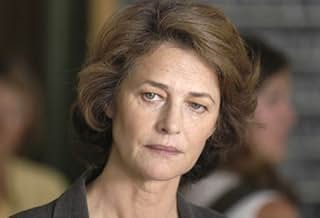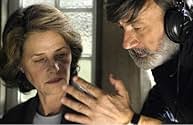IMDb RATING
7.1/10
2.5K
YOUR RATING
Meeting his disabled son for the first time, a young father attempts to forge a relationship with the teenager.Meeting his disabled son for the first time, a young father attempts to forge a relationship with the teenager.Meeting his disabled son for the first time, a young father attempts to forge a relationship with the teenager.
- Awards
- 15 wins & 22 nominations total
Featured reviews
10PAolo-10
This is the first Amelio movie to be released in the US, at least in a Film Festival setting, in over ten years since Lamerica. But the director's style is still memorable. The camera scans slowly the lost faces of the actors without pity or shame. There is no plastic, no trinkets, no nudging at the spectator. We are there watching and not, it's not really as straightforward as we'd want it.
As in "Stolen Children" or "Lamerica", the main character ambles on scene, uncertain of his role in the life of others or just very mistaken. It learns--maybe, the hard way, one feeling at the time. Kim Rossi Stuart takes the place of Enrico Lo Verso, with a similar style, eyes lost and the silence prevailing over revelatory dialog, but the star is his son in the movie, Andrea Rossi There are no cheap shot. There is no need to. Piety, compassion come from something deeper, and Amelio definitely gets to the grittier level of human emotion. Charlotte Rampling has an amazing role, as the mother of young handicapped woman and the symbolic chorus for the interior dialog of the protagonist. And the dialog is pure and scary as it can be.
It's refreshing to see such moving work that skillfully avoids all the traps of classic Hollywood tearjerkers. The movie reminded me rather of Kenzaburo Oe's "Teach Us to Outgrow our Madness", but it's actually inspired to Giuseppe Pontiggia's "Nati due Volte" (Born Twice), and Amelio pays homage both to the writer and the book in the course of the movie.
As in "Stolen Children" or "Lamerica", the main character ambles on scene, uncertain of his role in the life of others or just very mistaken. It learns--maybe, the hard way, one feeling at the time. Kim Rossi Stuart takes the place of Enrico Lo Verso, with a similar style, eyes lost and the silence prevailing over revelatory dialog, but the star is his son in the movie, Andrea Rossi There are no cheap shot. There is no need to. Piety, compassion come from something deeper, and Amelio definitely gets to the grittier level of human emotion. Charlotte Rampling has an amazing role, as the mother of young handicapped woman and the symbolic chorus for the interior dialog of the protagonist. And the dialog is pure and scary as it can be.
It's refreshing to see such moving work that skillfully avoids all the traps of classic Hollywood tearjerkers. The movie reminded me rather of Kenzaburo Oe's "Teach Us to Outgrow our Madness", but it's actually inspired to Giuseppe Pontiggia's "Nati due Volte" (Born Twice), and Amelio pays homage both to the writer and the book in the course of the movie.
We thought this was a touching story of the real tragedy of a parent dealing with the life-long disability, all the more so since this parent had walked away so early in child's life. We were much impressed with Charlotte Rampling, who we have seen in many good roles, who gave a marvelous portrayal of parent who have given her whole life to the care of her own daughter, willingly, but with the admonishment to the younger father in brutal honestly, to be prepared to suffer. We also wonder about her use of languages. Last film we saw she spoke French, and in this one Italian and German. Does she really speak these all, or her words dubbed in? We're glad she is working and always a true professional.
A love story. Or a friend story. Beautiful for the science to use the right tone about a delicate and painful problem. A touching portrait of parenthood. And its nuances. And its price. And its limits. After its end, the basic thing who remains, long time, alive in memory, is its special simplicity. Delicate, convincing, touching. Like a confession. With its lovely form of poetry of small, basic things. With the science to not be more than honest exposure of well known facts. For the flavor of personal story. And , not the last, as the expected film.
Director Gianni Amelio coaxed a wonderful performance from Andrea Rossi in this film - his lines were fed to him by the director, allowing this young non-actor to appear spontaneous. His charm and his stubbornness were powerful and endearing, and it would seem that it was the boy's real character and personality that were being very gently and cleverly allowed to shine.
Apart from Andrea Rossi, the strength of the film lay with Charlotte Rampling - although her part was a supporting role, her intelligence and dignity made a strong impact, and you wished that she would be there to counsel and guide Gianni through future events that he would perhaps not handle too well. She has matured into a very fine actress indeed, and one hopes that she will get the kind of roles she deserves in the future.
My first thought was that Kim Rossi-Stuart wasn't a good choice for the lead - good-looking certainly, but way too wooden an actor to carry a role as demanding as that of Gianni. On reflection, however, I wondered if casting an actor who appeared to have very little to give his role emotionally was deliberate, because it wasn't hard to believe that this was a man who deserted his son at his birth. Even when he slowly began to warm to his son, and we knew he desperately wanted to help, he was still awkward as he tried to compensate for his instinctive emotional detachment.
When he took his son from the hospital - clearly before his round of treatment was completed (this would certainly have to be an ongoing routine for Paolo) - this was not the action of a responsible, loving father but an act of rebellion from an immature man who couldn't, or wouldn't, see that the painful procedures were the only hope for some small improvement in Paolo's condition, and something that the boy himself accepted and participated in, however much he hated it.
Taking Paolo to Norway to visit his "girlfriend" Kristine was not an act of kindness, but one of insensitivity - in earlier scenes, although Paolo spoke of one day marrying her, he also had all sorts of excuses for not being able to meet her. Clearly, he was able to understand what his father could not - that she may reject him when she realised that he was not like other boys; yet he trusted his father enough to take the chance. It was when Gianni threw away his walking stick that I felt he had made very little progress from the boy who couldn't face up to his responsibilities to his motherless son - he was acting less from a desire to help Paolo walk on his own than he was trying to pretend that the boy's disabilities could be cured by an act of will and that he would one day be more like a "normal" son. This was explored further during the driving scene - having told Nicole earlier that Paolo didn't know how to construct boundaries, he encouraged him to think that he could drive and was then shattered when he realised the extent to which his son could at times fail to recognise the limitations that would always confront him. Was Paolo himself unconsciously trying to teach his father a lesson by behaving in the same irresponsible way that Gianni had been?
The ending of the film therefore presented us with two possibilities - Gianni's newly-awakened love might lead him to a new sense of maturity and responsibility if he could accept that love was not going to be a miracle cure, or he just might once again abandon his child to others. For Paolo's sake and his father's too, I'd like to think that Gianni would have developed a new perspective on his physical and emotional journey with his difficult and beautiful son.
Apart from Andrea Rossi, the strength of the film lay with Charlotte Rampling - although her part was a supporting role, her intelligence and dignity made a strong impact, and you wished that she would be there to counsel and guide Gianni through future events that he would perhaps not handle too well. She has matured into a very fine actress indeed, and one hopes that she will get the kind of roles she deserves in the future.
My first thought was that Kim Rossi-Stuart wasn't a good choice for the lead - good-looking certainly, but way too wooden an actor to carry a role as demanding as that of Gianni. On reflection, however, I wondered if casting an actor who appeared to have very little to give his role emotionally was deliberate, because it wasn't hard to believe that this was a man who deserted his son at his birth. Even when he slowly began to warm to his son, and we knew he desperately wanted to help, he was still awkward as he tried to compensate for his instinctive emotional detachment.
When he took his son from the hospital - clearly before his round of treatment was completed (this would certainly have to be an ongoing routine for Paolo) - this was not the action of a responsible, loving father but an act of rebellion from an immature man who couldn't, or wouldn't, see that the painful procedures were the only hope for some small improvement in Paolo's condition, and something that the boy himself accepted and participated in, however much he hated it.
Taking Paolo to Norway to visit his "girlfriend" Kristine was not an act of kindness, but one of insensitivity - in earlier scenes, although Paolo spoke of one day marrying her, he also had all sorts of excuses for not being able to meet her. Clearly, he was able to understand what his father could not - that she may reject him when she realised that he was not like other boys; yet he trusted his father enough to take the chance. It was when Gianni threw away his walking stick that I felt he had made very little progress from the boy who couldn't face up to his responsibilities to his motherless son - he was acting less from a desire to help Paolo walk on his own than he was trying to pretend that the boy's disabilities could be cured by an act of will and that he would one day be more like a "normal" son. This was explored further during the driving scene - having told Nicole earlier that Paolo didn't know how to construct boundaries, he encouraged him to think that he could drive and was then shattered when he realised the extent to which his son could at times fail to recognise the limitations that would always confront him. Was Paolo himself unconsciously trying to teach his father a lesson by behaving in the same irresponsible way that Gianni had been?
The ending of the film therefore presented us with two possibilities - Gianni's newly-awakened love might lead him to a new sense of maturity and responsibility if he could accept that love was not going to be a miracle cure, or he just might once again abandon his child to others. For Paolo's sake and his father's too, I'd like to think that Gianni would have developed a new perspective on his physical and emotional journey with his difficult and beautiful son.
Story about love, duty and the shadows of past. About the touch of two different worlds, about a child and his father and the forms of beauty and freedom. A movie about essential things of passing days and the heart of words, images and appearances. A film of an actor, the impressive Andrea Rossi, delicate, expressive, natural. Basic, manifesto for understand a disease. In fact, lesson about the science to discover the other. About the way for be yourself. A film as a water. Colors, nuances, gravel. And subtle interpretation of Charlotte Rampling, the strain of Stuart Rossi's character and the gestures of special star - Andrea Rossi. Touching, profound and natural. A movie like a time of world's contemplation in deep silence. As walk on the beach in the evening. Or a time of talk with your feelings.
Did you know
- TriviaAndrea Rossi suffers from muscular dystrophy in real life.
- ConnectionsReferenced in The Holiday (2006)
- How long is The Keys to the House?Powered by Alexa
Details
- Release date
- Countries of origin
- Official site
- Languages
- Also known as
- The Keys to the House
- Filming locations
- Production companies
- See more company credits at IMDbPro
Box office
- Gross worldwide
- $4,537,451
- Runtime1 hour 51 minutes
- Color
- Sound mix
- Aspect ratio
- 1.85 : 1
Contribute to this page
Suggest an edit or add missing content

